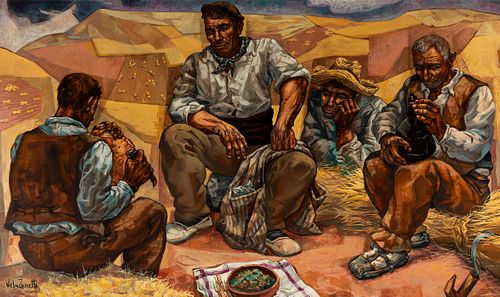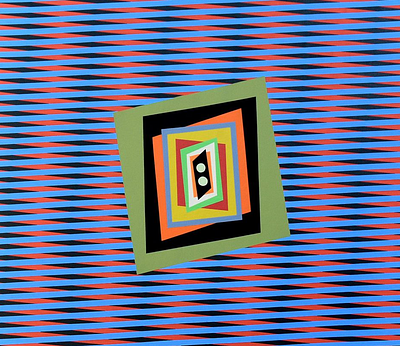JOSÉ VELA ZANETTI (Milagros, Burgos, 1913 - Burgos, 1999). "Breaking bread", Milagros, 1972. Oil on panel.
Lot 131
About Seller
Setdart Auction House
Carrer Aragó 346
Barcelona
Spain
Setdart Subastas was born in 2004 and is currently the first online art auction in Spain with solidity, prestige and reliability guaranteed by our more than 60,000 users. Setdart has a young, dynamic and enterprising team ready to successfully manage the purchase and sale of art works through custom...Read more
Categories
Estimate:
EUR€25,000 - EUR€30,000
$26,315.79 - $31,578.95
Absentee vs Live bid
Two ways to bid:
- Leave a max absentee bid and the platform will bid on your behalf up to your maximum bid during the live auction.
- Bid live during the auction and your bids will be submitted real-time to the auctioneer.
Bid Increments
| Price | Bid Increment |
|---|---|
| EUR€0 | EUR€10 |
| EUR€200 | EUR€25 |
| EUR€500 | EUR€50 |
| EUR€1,000 | EUR€100 |
| EUR€3,000 | EUR€200 |
| EUR€5,000 | EUR€500 |
| EUR€10,000 | EUR€1,000 |
| EUR€20,000 | EUR€2,000 |
| EUR€50,000 | EUR€5,000 |
About Auction
By Setdart Auction House
Dec 15, 2021
Set Reminder
2021-12-15 07:00:00
2021-12-15 07:00:00
America/New_York
Bidsquare
Bidsquare : Contemporary and Actual Art
https://www.bidsquare.com/auctions/setdart-auction-house/contemporary-and-actual-art-7967
Setdart Auction House sofia@setdart.com
Setdart Auction House sofia@setdart.com
- Lot Description
JOSÉ VELA ZANETTI (Milagros, Burgos, 1913 - Burgos, 1999). "Breaking bread", Milagros, 1972. Oil on panel. Signed, dated and located in the lower left corner. Attached certificate signed by the artist. A preparatory drawing for this work is published in the book "VELA ZANETTI" by Victoriano Crémer, 1974. Measurements: 150 x 250 cm; 165 x 264 cm (frame). From Milagros, his hometown, Vela Zanetti created a personal vision of the peasantry. In his works he gave birth to a true epic of the rural world, whose customs, people and work he represented with a profound sense of human dignity. The large-format panel presented here shows the splendid technique of the artist from Burgos, based on a masterly forceful stroke and a warm, richly nuanced chromaticism. In front of a field in his native Castile, a group of four peasants stop their daily chores to have lunch, leaving aside their sickles and other work tools. The four characters, arranged in a circle around the central snack while drinking from a wineskin and breaking a loaf of bread, reveal the sacred and solemn condition sought by Zanetti. Born in Milagros, in the province of Burgos, he moved to León with his family when he was a child. There he held his first exhibition in 1931. Supported by his father, after finishing high school he travels to Madrid for a few months to see exhibitions and visit the Prado Museum. Shortly afterwards he obtained a scholarship to visit Italy, granted by the Provincial Council of León. As a consequence of the Spanish Civil War he went to the Dominican Republic, where he remained until 1960. In Santo Domingo he started, together with other exiled artists, the National School of Fine Arts. During this period he held exhibitions and projects in Mexico, Colombia, Puerto Rico and the United States. In 1951 the John Simon Guggenheim Foundation of New York awarded him a grant for a singular project: the creation of a large-scale mural for one of the main spaces of the United Nations headquarters, in commemoration of the fiftieth anniversary of the Universal Declaration of Human Rights. This project definitively catapulted the master from Burgos, and is today considered his most important work both for its symbolic relevance and for its expressiveness and artistic quality. He himself said of this work: "I hope that those who contemplate this mural will realize that peace must be won, not once and forever, but every day, remembering the sufferings of the past and making real what men aspire to for the future". Vela Zanetti also painted other important murals, such as those on historical themes for the Provincial Council of Burgos or the frescoes of the old Ercilia Theater in Barahona, Dominican Republic. He was an academician of San Fernando, and Doctor Honoris Causa by the University of Burgos. The Centro Cultural de la Villa de Madrid held in 2001, under the title "Antológica", a retrospective exhibition on the work of Vela Zanetti, the most important to date. In 2009 an exhibition commemorating the tenth anniversary of his death was held at the Ángeles Penche gallery in Madrid. In short, an important exhibition dedicated to the work of Vela Zanetti, commemorating the centenary of his birth and the most complete anthology of this painter held to date, was held at the Fórum Evolución in Burgos. His works are currently preserved in the funds of the Caja Rural de Burgos and the Vela Zanetti Foundation in León, as well as murals in various cities in Spain, Santo Domingo, the United States, Colombia and Switzerland.
- Shipping Info
-
In-house shipping available. Please inquire at admin@setdart.com.
-
- Buyer's Premium



 EUR
EUR CAD
CAD AUD
AUD GBP
GBP MXN
MXN HKD
HKD CNY
CNY MYR
MYR SEK
SEK SGD
SGD CHF
CHF THB
THB















